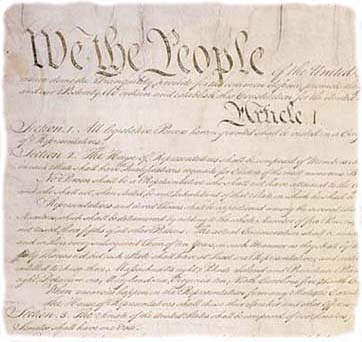by Mike Maharrey
We continue to see evidence that the majority of American’s accept the fundamental principle our founders held as they formed the United States: that the federal government should exercise limited and defined powers, restrained within constitutional parameters. Granted, they may not express it in those words, but several measures of public opinion over the last week indicate that majorities of Americans embrace these core values.
Last week, the Tenth Amendment Center reported Rasmussen polling data showing a majority of Americans believe states should have the power to opt out of federal programs and that a question centering on the Tenth Amendment received the most votes prior to the Fox News presidential debate on Sept. 22. You can read more about that here and here.
Now we have Gallup polling data indicating a vast majority of Americans “are dissatisfied with the nation’s governance,†and further that nearly half of those polled believe the federal government possesses too much power.
According to the data released Sept. 26, “Forty-nine percent of Americans believe the federal government has become so large and powerful that it poses an immediate threat to the rights and freedoms of ordinary citizens. In 2003, less than a third (30 percent) believed this.â€
Wrap your head around that. Pick two people at random, and one will likely say he finds the size and scope of federal power threatening.
Increasing numbers of Americans expressing fear of the government shouldn’t come as a surprise. We’ve seen more and more aggressive and overt use of federal power in the last nine years, and increasingly blatant disregard of basic constitutional principles. Congress insisting we purchase health insurance. The current administration using the EPA to enforce environmental policy Congress would not approve. The previous administration granting sweeping “Patriot Act†powers, allowing federal agents to snoop without warrants. We get groped at the airport and run the risk of arrest for selling the “wrong†kind of milk. Presidents defiantly ignore war powers. TARP.  Stimulus. Skyrocketing debt. And on and on it goes.
People recognize the threat posed by concentrated power. Why do you think the word “monopoly†has such negative connotations? It may take Americans a little longer to feel the threat posed by government monopoly than it does for them to rail against economic monopoly. But, as this poll makes clear, let the feds squeeze hard enough and the people begin to react to the pressure.
But looking inside the numbers reveals an interesting trend. In the latest poll, Republicans (61 percent) and independents (57 percent) were far more likely to view the federal government as a threat to freedom. Only 28 percent of Democrats expressed such a viewpoint. But when George W. Bush was in office, the trend was reversed. In a 2006 poll using the same wording, 66 percent of Democrats and only 21 percent of Republicans agreed that, “the federal government has become so large and powerful that it poses an immediate threat to the rights and freedoms of ordinary citizens.â€
It appears that partisans tend to look the other way when government power expands under “their guyâ€, but react in abject horror when the same thing happens on the “other guy’s†watch.
In fact, both “guys†expand government, and it poses an equal threat either way. If I see a car driven by a drunk driver hurtling down the highway, coming at me head-on, I don’t give a rip who’s driving it. I just want it to stop!
Tenth Amendment Center executive director Michael Boldin hits the nail on the head.
“For over a century, we’ve had winners on the left, and winners on the right.  And not a single one of them – not one – has followed the constitution as they were supposed to, and as we at the Tenth Amendment Center demand – every issue, every time, no exceptions and no excuses.â€
I could easily become frustrated by these partisan blinders, but I prefer to look at it as an opportunity. I know blinders can come off. And when you look at the numbers over time, it becomes clear that at some level, both Democrats and Republicans, left and the right, liberals and conservatives, recognize the danger of concentrated power. So, we have an opportunity. We have an opportunity to bridge the gap and find common ground. We have an opportunity to reach across the proverbial aisle and find the unity so many Americans say they long for.
We can rally around the Constitution. We can circle the wagons around the Tenth Amendment. And we can stand together and insist that the federal government leave us the hell alone, and let us work together at the state and local level to solve our problems as we see fit. This idea embodies the American spirit. We see it reflected in public opinion, and when we can get people to look past the partisan template, we can see that Americans share these values. And clearly, people continue to tap into that sentiment in increasing numbers.
Now, if they can just cast off those binders…
Economist Milton Friedman asked a poignant question.
“How can we keep the government we create from becoming a Frankenstein that will destroy the very freedom we establish it to protect? Freedom is a rare and delicate plan.â€
I turn to Thomas Jefferson for an answer.
“In questions of power, let no more be heard of confidence in man, but bind him down from mischief by the chains of the Constitution.
Every issue. Every time. No exceptions. No excuses.
- Anti-Federalist Objections: Pennsylvania Dissent Explained - December 16, 2024
- A Republic at Risk: Cato’s Anti-Federalist Warnings - December 9, 2024
- Reversing Gresham’s Law: How Sound Money Could Drive Out Fiat - December 6, 2024

